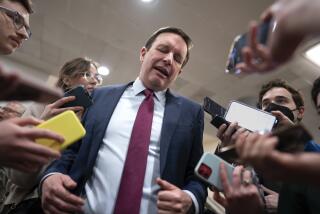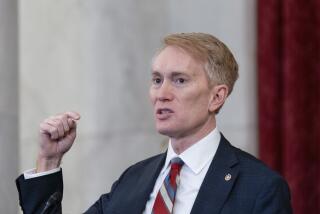Stimulus Bill Compromise Falls Short Over Health Care
- Share via
WASHINGTON — Efforts by White House and congressional negotiators to reach a final agreement on legislation to stimulate the economy stalled Tuesday over an issue that has split lawmakers repeatedly in recent years: health care policy.
Democrats and Republicans have made significant concessions to produce a compromise bill that would provide tax cuts to individuals and businesses and more aid for the unemployed.
But formal talks by a House-Senate conference committee broke off Tuesday night, in large part because of stubborn differences over the question of how to help the unemployed keep or buy health insurance--through direct government subsidies or by providing tax credits to help defray the cost of the policies.
That relatively narrow question reopened deep divisions between the parties that have undercut efforts throughout the last decade to overhaul the nation’s health insurance system and to shore up the Medicare program.
“People are so dug in,” said Sen. John D. “Jay” Rockefeller IV (D-W.Va.). “It goes back to the old fights of the 1990s.”
Some lawmakers expressed hope that, even though negotiations broke down in the formal House-Senate conference committee, President Bush and congressional leaders could find a way to break the impasse. Bush is scheduled to meet with GOP lawmakers on Capitol Hill today.
But the make-or-break moment is virtually at hand because Congress is supposed to adjourn at the end of this week.
Bush tried to increase the pressure in a meeting with congressional leaders Tuesday. “The president does not want to give up,” said White House Press Secretary Ari Fleischer.
Republican leaders prepared to hold a House vote today on a revised version of a stimulus bill they pushed through the chamber in October. The original bill stressed tax cuts as the best medicine for the ailing economy; the revised version would provide less in tax cuts and more in benefits for the unemployed. The Republicans calculated that the new vote would give their party a fresh opportunity to show support for popular unemployment programs and would send to the Senate a bill that could be harder for that chamber’s Democratic leaders to block.
The decision to schedule today’s vote was a signal that GOP leaders had essentially abandoned hope of a negotiated settlement.
“We don’t want to slam the door in anyone’s face, but the clock is running,” said House Majority Leader Dick Armey (R-Texas).
Senate Majority Leader Tom Daschle (D-S.D.) predicted the Senate would reject any new GOP stimulus bill unless it made bigger concessions on aiding unemployed workers with health insurance.
“That isn’t going to work,” said Daschle. “There aren’t 60 votes for any of these Republican proposals.”
Daschle and his Republican counterpart, Senate Minority Leader Trent Lott of Mississippi, agreed on one thing: Prospects were dimming that Congress could reach an agreement on stimulus legislation.
In anticipation of a stalemate, both sides are pursuing strategies of blaming the other for a failure to produce a bill. Led by Bush, Republicans have targeted Daschle, accusing him of allowing partisanship to thwart efforts to help the economy. Democrats, in turn, charge that the Republicans want to use the stimulus bill as a smoke screen for excessive tax breaks for big business.
Some independent analysts, meanwhile, question the need for any stimulus bill, saying that whatever boost to the economy it might now provide would be too little, too late.
Behind the rhetoric being exchanged by the two parties, both sides have quietly moved to a middle ground on a number of key issues.
Democrats initially indicated they would block all of Bush’s proposals to accelerate the reductions in income tax rates called for by the sweeping tax cut bill that became law earlier this year. But Democratic negotiators have signaled they would support cutting the 27% tax rate to 25% in 2002--four years ahead of schedule--if Republicans agree to a more generous package of aid to the unemployed.
And while Republicans, especially in the House, have adamantly insisted on repealing the law that requires businesses to pay at least some corporate tax, Armey said Tuesday that the GOP’s new version of the stimulus bill would reduce but not repeal the so-called alternative minimum tax provision.
But the division between the parties over health care has proved especially hard to settle. Democrats have backed a plan that would build on an existing law that allows people who lose their jobs to buy into continuing coverage in their former employers’ group health insurance. To make that costly option more affordable to the unemployed, Democrats have proposed having the federal government pay 75% of the cost of the premiums under the existing law, known as COBRA.
Because that would not help those who did not have health insurance when they were working, Democrats also have proposed allowing states to expand their Medicaid programs to provide more coverage for the unemployed.
Bush expressed concern Tuesday that the Democratic plan was too broad because it would go not just to laid-off workers but also to people who have taken early retirement or otherwise voluntarily left their jobs.
Republicans, by contrast, want to provide aid in the form of tax credits to help individuals pay for either their COBRA premiums or to buy their own health insurance policies.
Democrats have objected to that approach, saying there is no guarantee that people, especially the elderly and the sick, will be able to secure health insurance policies at an affordable price. They have indicated willingness to provide tax credits to employers, not individual workers, who could offer continuing coverage at more affordable rates. But Democrats fear that the whole effort is the opening gambit in a broader GOP effort to provide health insurance tax credits for all Americans.
The dispute echoes past arguments about how best to revamp America’s health care system. Republicans tend to argue that the way to improve the health care system is to introduce more competition among providers and to give individuals more freedom to choose their own plans.
Democrats worry that that would undercut the system of employer-provided health care.
As negotiations continued Tuesday night, Sen. Max Baucus (D-Mont.) tried to bridge the difference by proposing an alternative way to provide health insurance for the unemployed by helping them buy coverage through federal employees’ health plans or other existing risk pools.
*
Times staff writers Nick Anderson and Edwin Chen contributed to this report.
More to Read
Get the L.A. Times Politics newsletter
Deeply reported insights into legislation, politics and policy from Sacramento, Washington and beyond. In your inbox three times per week.
You may occasionally receive promotional content from the Los Angeles Times.











